| Medically reviewed by
Robin Backlund, BHSc
Last update:
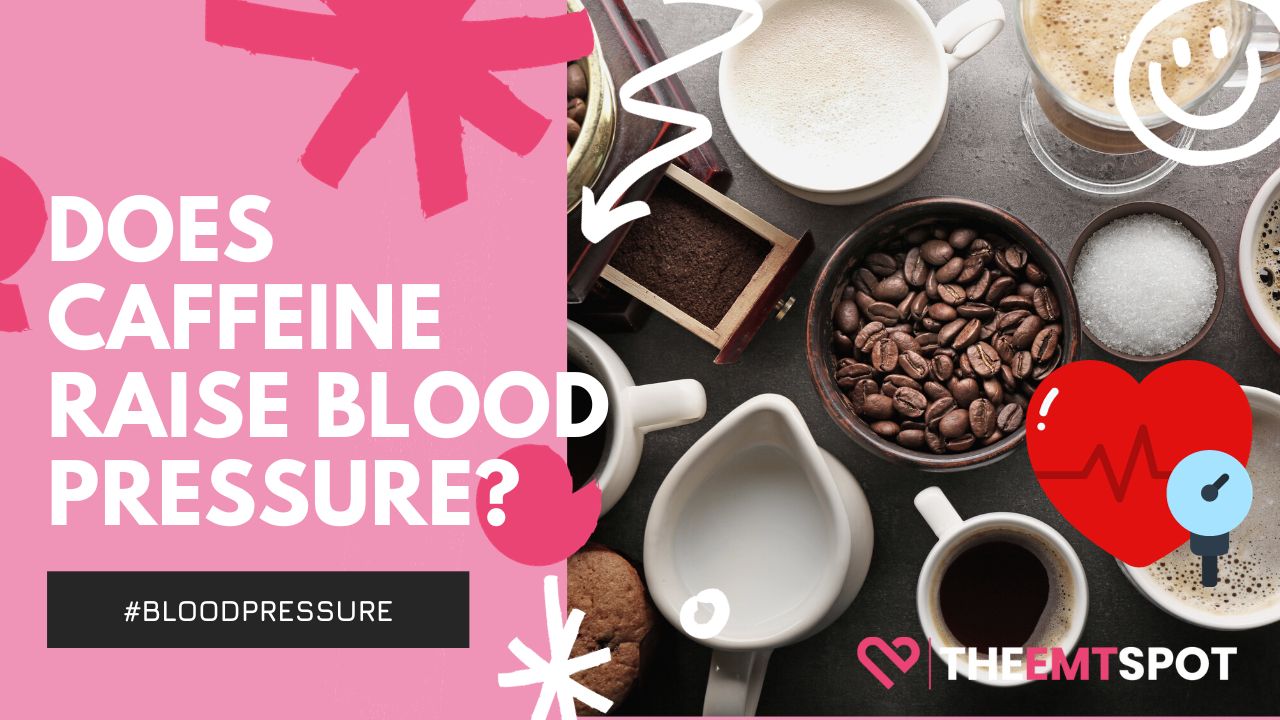
Understanding the relationship between caffeine and blood pressure is critical for maintaining heart health.
High blood pressure, or hypertension, is a condition where the force of blood against artery walls is too high, potentially leading to health complications.
Caffeine, a stimulant found in various foods and beverages, is known for its ability to temporarily boost energy levels.
It can cause a short-term increase in blood pressure. This effect is generally seen immediately after consumption and lasts for a short time thereafter.
However, the exact mechanism behind this increase in blood pressure is not entirely clear. The specific reason for the rise in blood pressure due to caffeine is not fully understood.
It might be related to caffeine’s ability to stimulate the central nervous system, or it could be because caffeine blocks a hormone that helps keep your arteries widened.
A significant research report featured in the American Journal of Clinical Nutrition, authored by Arthur Eumann Mesas and colleagues, revealed that the intake of 2 to 4 cups of coffee, equivalent to 200-300 mg of caffeine, results in an average rise of 8.1 mmHg in systolic blood pressure and 5.7 mmHg in diastolic blood pressure.
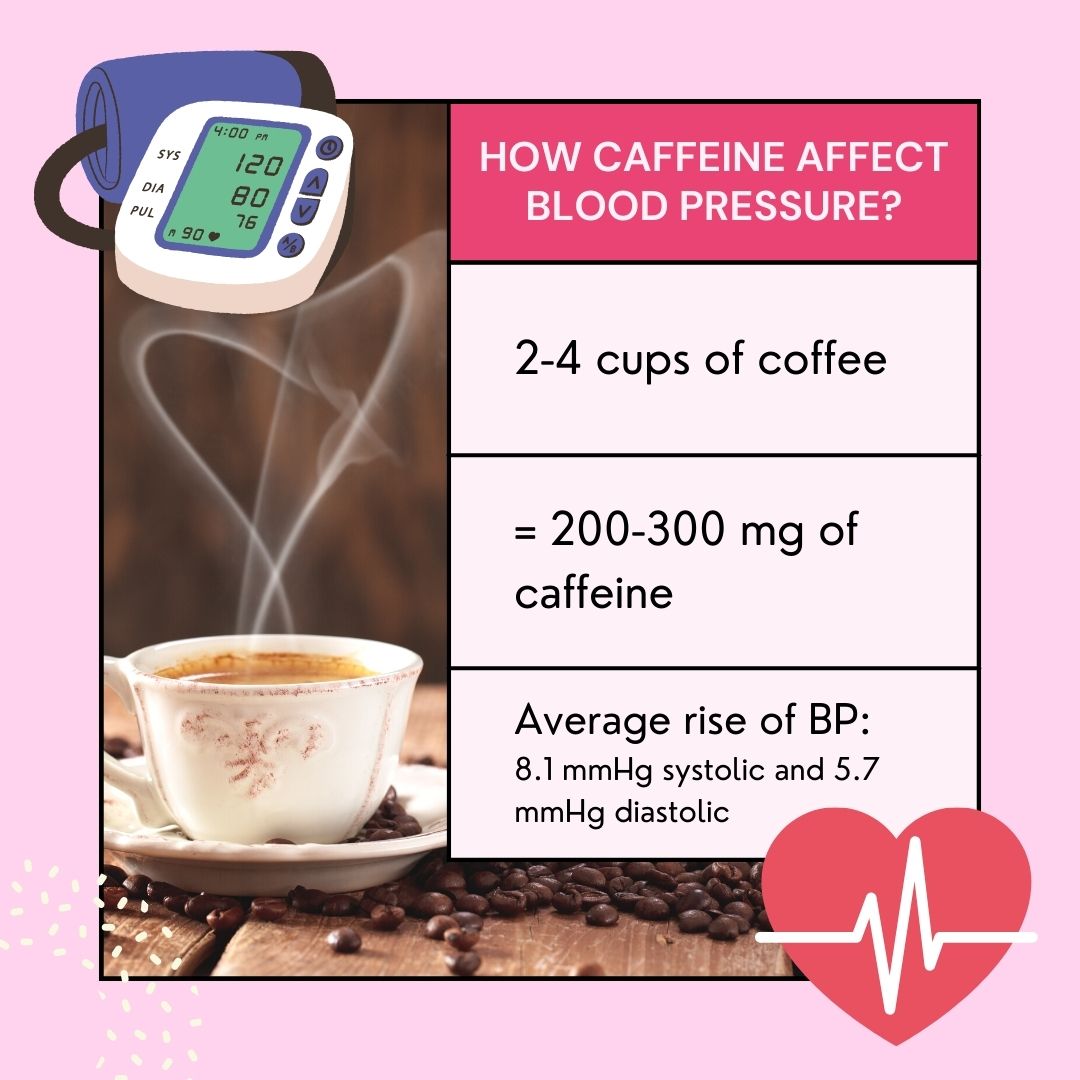
Not only that, but there are several hundred studies supporting this finding that caffeine has a stimulatory effect and increases blood pressure in the majority of users.
Caffeine is found in a variety of sources, and some of the most common sources are foods that we consume every day are given below.
- Coffee
- Tea
- Soft drinks
- Energy drinks
- Certain medications
- Chocolate
Generally, products like coffee and energy drinks tend to have higher caffeine content compared to others like chocolate. However, individual responses can vary greatly, as most processed foods tend to have higher caffeine content.
While the food that affects blood pressure depends on factors like frequency and quantity of consumption, individual physiology, gender, etc., in a general consensus, coffee and energy drinks tend to have a direct and immediate impact on blood pressure.
On the other hand, decaffeinated coffee and chocolate are two foods that have relatively lesser caffeine content, so their consumption might not have as strong an effect as that of the above-mentioned foods.
Contents
How much does caffeine raise blood pressure?
The effect of caffeine on blood pressure is a subject of interest in the medical community, and studies have shown some general trends.
Consuming caffeine can lead to a moderate increase in blood pressure, with variations in response among different individuals.
According to a review published by Prof. Steven G. Chrysant in the Expert Review of Cardiovascular Therapy, consuming 200-300 mg of caffeine, roughly equivalent to 2-3 cups of coffee, can temporarily raise systolic blood pressure by 3-14 mmHg and diastolic blood pressure by 4-13 mmHg.
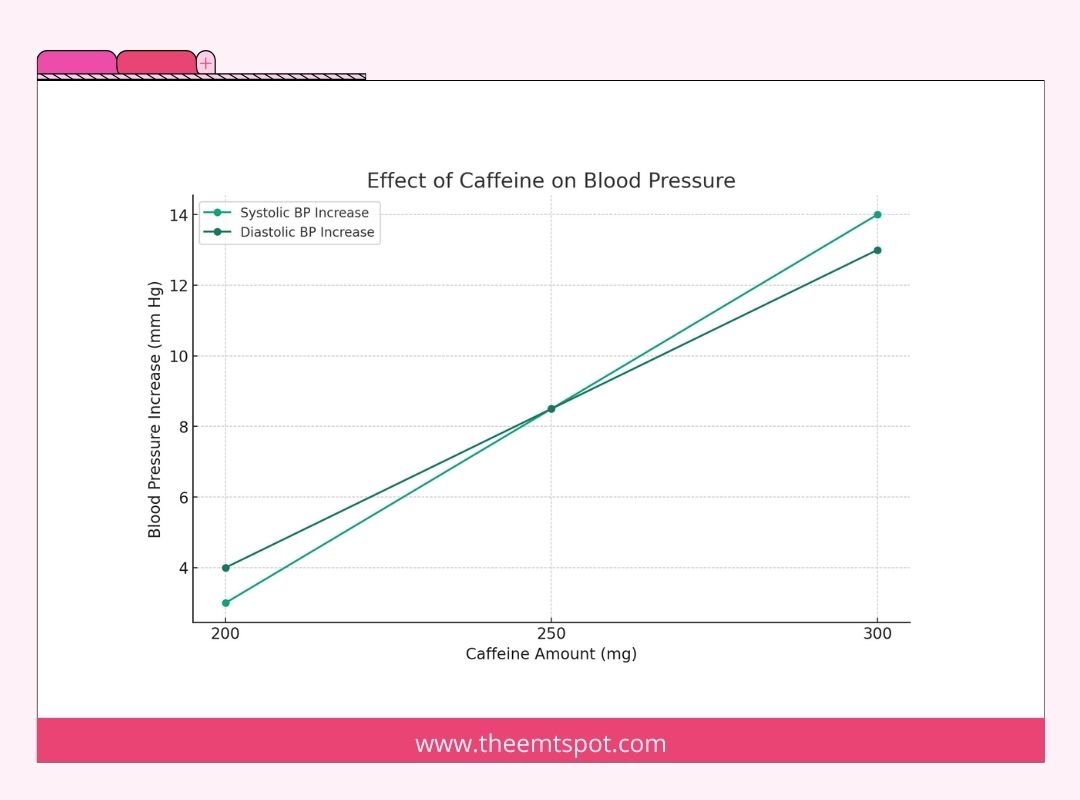
This effect, as noted by the Mayo Clinic, is particularly evident in people who are not regular caffeine consumers, indicating a sensitivity to caffeine’s effects.
In terms of duration, the blood pressure elevation due to caffeine lasts about 3-4 hours, as reported by a team of researchers from South Dakota State University.
This timeframe suggests that the impact of caffeine on blood pressure is relatively short-term.
However, it’s important to acknowledge that regular consumers of caffeine might develop a tolerance, potentially diminishing these effects over time.
Given these findings, individuals with hypertension or those who are sensitive to caffeine should be cautious and consult a doctor for personalized advice regarding caffeine intake and blood pressure management.
But that doesn’t mean caffeine doesn’t have any long-term effects. Regular users might experience several effects, which are explained below.
What are the potential long-term effects of caffeine on blood pressure?
The long-term effects of caffeine on blood pressure is a much debated topic. For some individuals, habitual caffeine consumption may lead to a slight, persistent increase in blood pressure.
However, this effect varies greatly among individuals, and many habitual caffeine users may develop a tolerance to its blood pressure-raising effects.
It’s important to note that the relationship between long-term caffeine intake and the risk of developing hypertension (high blood pressure) is not entirely clear.
Some studies suggest a potential link, while others find no significant association.
This inconsistency could be due to various factors, including genetic differences in caffeine metabolism, differences in individual responses to caffeine, and variations in study designs and methodologies.
One popular study is published by Prof. P J Green & colleagues from University of Iowa according to whom while acute increases in blood pressure due to caffeine are evident, the long-term effects appear to be minimal.
He also noted that, individuals at risk for hypertension might be more vulnerable to the blood pressure effects of caffeine.
While occasional caffeine consumption might not have a significant long-term effect, regular intake could potentially exacerbate high blood pressure.
However, the extent to which caffeine influences blood pressure in hypertensive individuals over the long term is still being explored.
Given these uncertainties, individuals with or at risk for high blood pressure are often advised to monitor their caffeine intake and consult with healthcare professionals.
This is particularly important for those who experience noticeable increases in blood pressure following caffeine consumption.
As research continues to evolve, more definitive guidelines on caffeine intake and its long-term effects on blood pressure may emerge.
Because coffee is one of the most common caffeinated beverages, it has a significant impact on blood pressure. More information about this is described in the next section.
How does caffeine in coffee affect blood pressure?
Caffeine in coffee affects blood pressure through several mechanisms that target the nervous system to manipulate various signaling pathways, resulting in various effects experienced after consuming coffee.
A 2016 study published by a team of researchers from TM McLellan Research Inc., led by Dr. Tom M. McLellan, discusses the physical and mental impacts of caffeine and its application in occupational performance. The exact mechanisms discussed in the study are elaborated below:
- Stimulation of the nervous system: Caffeine acts as a central nervous system stimulant by inhibiting the function of adenosine, a neurotransmitter responsible for calming the brain and inducing a sense of fatigue. This blocking leads to an increase in other neurotransmitters, which can stimulate the heart and cause a temporary rise in blood pressure.
- Effect on blood vessels: Caffeine may cause blood vessels to narrow (vasoconstriction), which can temporarily increase blood pressure. However, the degree and duration of this impact may vary from person to person.
- Adrenaline release: Caffeine can stimulate the adrenal glands to release more adrenaline, a hormone that increases heart rate and blood pressure.
- Tolerance development: Regular caffeine consumers may develop tolerance to its blood pressure effects. This means that over time, the same amount of caffeine may have a lesser effect on blood pressure in habitual coffee drinkers compared to those who consume coffee less frequently.
It’s important to note that individual responses to caffeine can vary greatly. People who are sensitive to caffeine or have hypertension should be particularly cautious with their coffee consumption and may benefit from monitoring their blood pressure closely.
As always, it’s advisable to consult with your doctor for personalized advice regarding caffeine intake, especially for those with existing health concerns related to blood pressure.
But more importantly, tea is another common beverage after coffee, and does it have any impact on blood pressure? Find out in the upcoming section.
How does caffeine in tea affect blood pressure?
Caffeine in tea can have varying effects on blood pressure. While caffeine is a known stimulant that can temporarily increase heart rate and blood pressure, its presence in tea is comparatively lower, resulting in a milder effect on blood pressure.
For some people, especially those who are not regular caffeine consumers, a few cups of tea can lead to a noticeable rise in blood pressure.
However, regular caffeine consumers may develop a tolerance, resulting in a less pronounced effect on blood pressure.
Unlike coffee, there is not much debate about the cardiovascular impact of tea. It is believed to have a positive effect on blood pressure.
A study titled “Effects and Mechanisms of Tea Regulating Blood Pressure: Evidence and Promises,” published in the journal Nutrients, highlights the positive impact of tea.
Based on their findings, tea and its secondary compounds have significant functions in relaxing smooth muscle contraction, boosting endothelial nitric oxide synthase activity, decreasing inflammation within blood vessels, suppressing renin activity, and mitigating oxidative stress in the vasculature.
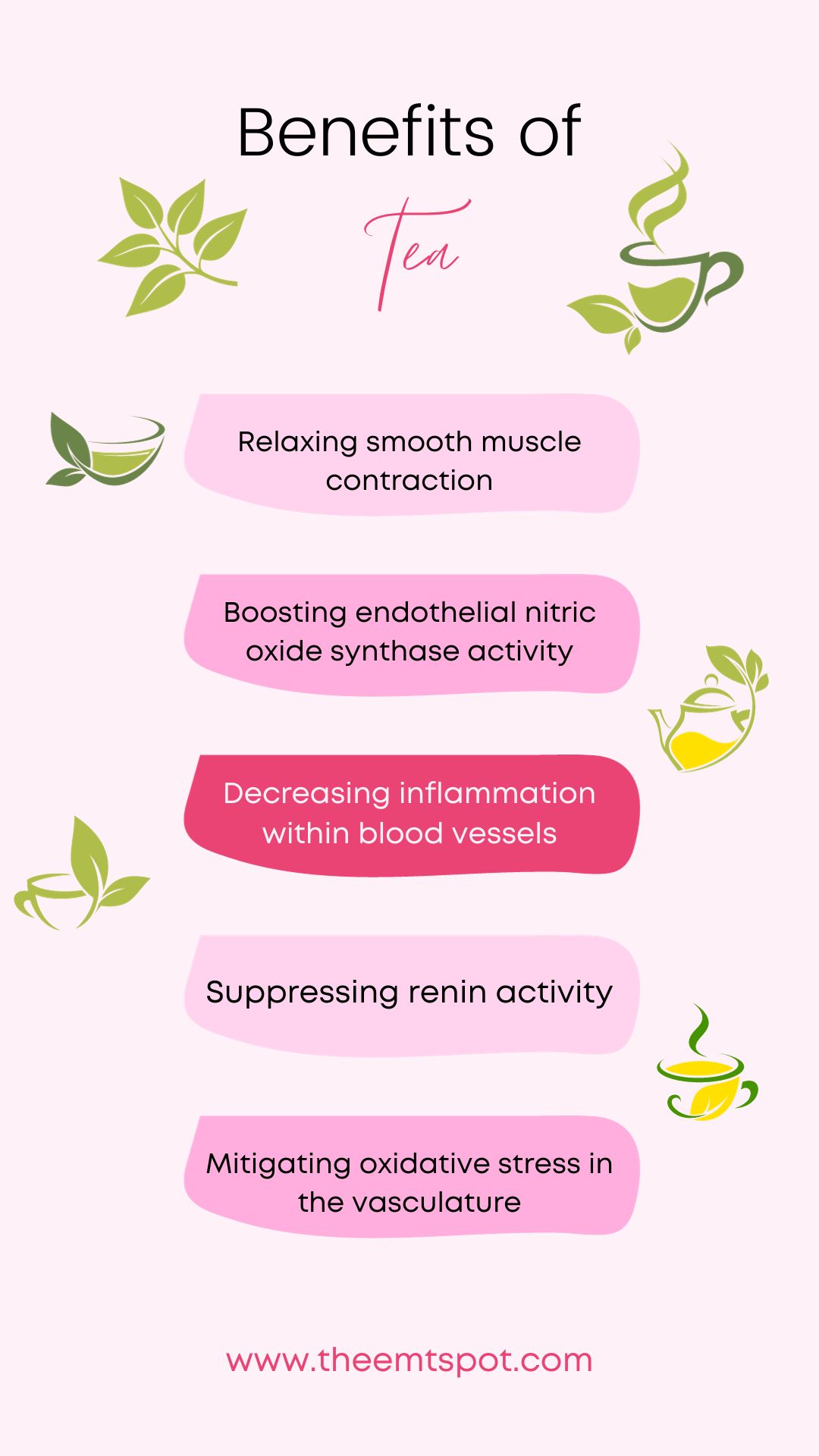
Herbal teas, such as hibiscus or chamomile, are better options for those concerned about blood pressure, as they are naturally caffeine-free and have been linked to positive cardiovascular effects in some studies.
On the other hand, teas high in caffeine, like black tea or matcha, might be less advisable for individuals with high blood pressure, particularly if they are sensitive to caffeine.
For those on blood pressure medication, it’s usually safe to drink tea, but moderation is key, and it’s important to be mindful of caffeine content.
Completely eliminating tea from one’s diet is not necessarily required for individuals with high blood pressure, unless advised by a healthcare professional.
Opting for low-caffeine or caffeine-free teas and monitoring personal responses to tea consumption can be a prudent approach to enjoying tea without adversely affecting blood pressure.
While the impact of tea consumption on blood pressure is generally positive, the same cannot be said for carbonated beverages like soda that contain caffeine.
The next section will help you understand why some caffeinated sodas are detrimental to blood pressure.
How does caffeine in soda affect blood pressure?
Caffeine is often added to sodas for flavor enhancement and its mild energizing effect. Carbonated energy drinks are some of the most popular caffeine-based sodas, and their apparent benefits are well-known.
In sodas, caffeine’s impact on blood pressure is noteworthy. It activates the nervous system, potentially leading to quicker heartbeats and constricted blood vessels.
A team of researchers from the University of Florida, in their publication in the Journal of Analytical Toxicology, compared various energy drinks and caffeinated sodas and observed that soda varieties usually contain 50mg of caffeine.
While caffeine at this concentration is not inherently harmful, the added sugar is considered unhealthy, and it all boils down to the quantity of the drink you consume.
For better blood pressure management, sodas with low or no caffeine content are advisable. Caffeine-free options like root beer and lemon-lime sodas are better choices.
Conversely, sodas high in caffeine, such as certain colas and energy drinks, might be less suitable for those monitoring blood pressure.
People taking blood pressure medications can usually consume soda in moderation, but it’s crucial to consider the caffeine content due to potential interactions with medications.
For those with high blood pressure, completely cutting out soda is not always necessary, but moderating intake, particularly of caffeine-rich varieties, is beneficial.
Substituting soda with healthier drinks like water, herbal teas, or low-sodium vegetable juices is a positive step towards managing high blood pressure.
While soda is a questionable caffeinated drink, chocolate has gained popularity as a blood pressure health promoter. But is it really beneficial for your blood pressure health? Check it out below.
How does caffeine in chocolate affect blood pressure?
Caffeine in chocolate is a natural stimulant derived from cocoa beans. It is similar to the caffeine found in coffee and tea but usually present in smaller quantities.
The quantity of caffeine present in chocolate fluctuates depending on the variety and quantity of cocoa utilized during its manufacturing process.
When consumed, the caffeine in chocolate can affect blood pressure. It stimulates the nervous system, which can lead to an increase in heart rate and a temporary rise in blood pressure.
The impact is more pronounced in individuals who have caffeine sensitivity or are not habitual caffeine consumers.
According to a meta-analysis conducted by prof. Karin Ried & colleagues from University of Australia found that a higher cocoa content, may actually help lower blood pressure in the short term due to its flavonoids, which have a blood pressure-lowering effect. This can counteract the caffeine’s effect to some extent.
Considering blood pressure, the best chocolates are those with higher cocoa content and lower caffeine, such as dark chocolate with at least 70% cocoa. These chocolates also have higher amounts of flavonoids, which are beneficial for heart health.
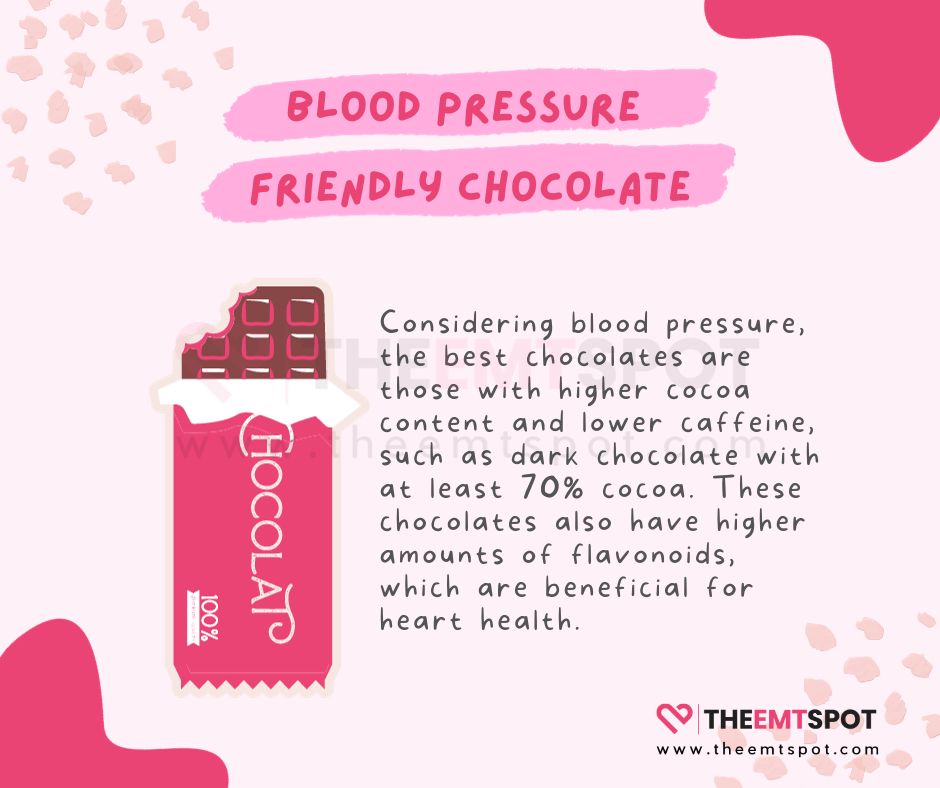
The worst choices would be milk chocolate and chocolate products with high sugar content, as they have more caffeine and less of the beneficial flavonoids.
People on blood pressure medication can typically consume chocolate in moderation. However, it is important to monitor the type and quantity of chocolate consumed, especially if the medication interacts with caffeine.
For individuals with high blood pressure, completely eliminating chocolate from the diet is not necessarily required.
Consuming moderate amounts of dark chocolate, which is lower in caffeine and higher in blood pressure-lowering flavonoids, can be part of a balanced diet.
However, it is important to be mindful of the quantity and type of chocolate consumed and to focus on maintaining an overall healthy lifestyle.
Guarana is another plant-based product that has been widely used in circulatory supplements for blood pressure optimization. Is there any scientific backing for it? Find out below.
How does caffeine in guarana affect blood pressure?
Caffeine in guarana is a natural stimulant found in the seeds of the Guarana plant. It is similar to the caffeine found in coffee, but guarana seeds contain about twice the concentration of caffeine as coffee beans.
The effects of guarana’s caffeine on blood pressure are similar to that of regular caffeine. It can cause an increase in blood pressure due to its stimulating effect on the nervous system.
This increase is generally temporary but can be more pronounced in individuals sensitive to caffeine or those not accustomed to consuming it.
An interesting study published in the Journal of Phytotherapy Research, conducted by a team of researchers from the Federal University of Santa Maria on Amazonian natives who include guarana as a staple in their diet reports protective effect of guarana.
According to the study, regular guaraná consumption was associated with lower blood pressure and reduced prevalence of hypertension, obesity, and metabolic syndrome.
While there are no specific varieties of the best or worst guarana, there are several products based on this plant that might impact your blood pressure.
Some of the best guarana products are capsule supplements containing less than 400mg of caffeine, which is a daily safe dose of caffeine.
Being in capsule form helps regulate the dosage. The same applies to other products like energy drinks, carbonated beverages, and bars.
However, the worst categories of guarana are those that contain added sugar or artificial sweeteners, which are harmful to the human system.
Secondly, there are energy drinks with 4-5 times the caffeine content of the safe limit, which should be avoided for safe blood pressure regulation.
For individuals on blood pressure medication, consuming guarana should be done cautiously, especially in high amounts, due to its potential interaction with some medications.
It’s advisable to check with your doctor before adding guarana to your diet if you’re on blood pressure medication.
For those with high blood pressure , it’s not necessary to completely eliminate guarana, but moderating its intake, particularly if it is high in caffeine, is recommended.
Balancing overall diet and lifestyle factors is also crucial in managing hypertension.
While guarana is a natural product with some beneficial impact on blood pressure, caffeine in energy drinks has is an entirely different story. More about it is described in the next section.
How do caffeine in energy drinks affect blood pressure?
Caffeine is a major component of many health drinks. Its capacity to stimulate the release of adrenaline, resulting in an increased heart rate and blood pressure, contributes to heightened alertness.
However, the high dosage of caffeine in energy drinks has been a cause for concern among various researchers, even though the safe limit of 400 mg has potential health benefits.
A recent study, published in the Journal of the American Heart Association (AHA), has raised concerns about the impact of energy drinks on heart health and blood pressure.
Researchers discovered that individuals who consumed 32 ounces of energy drinks within a single hour experienced abnormal electrical activity in their hearts and elevated blood pressure four hours later.
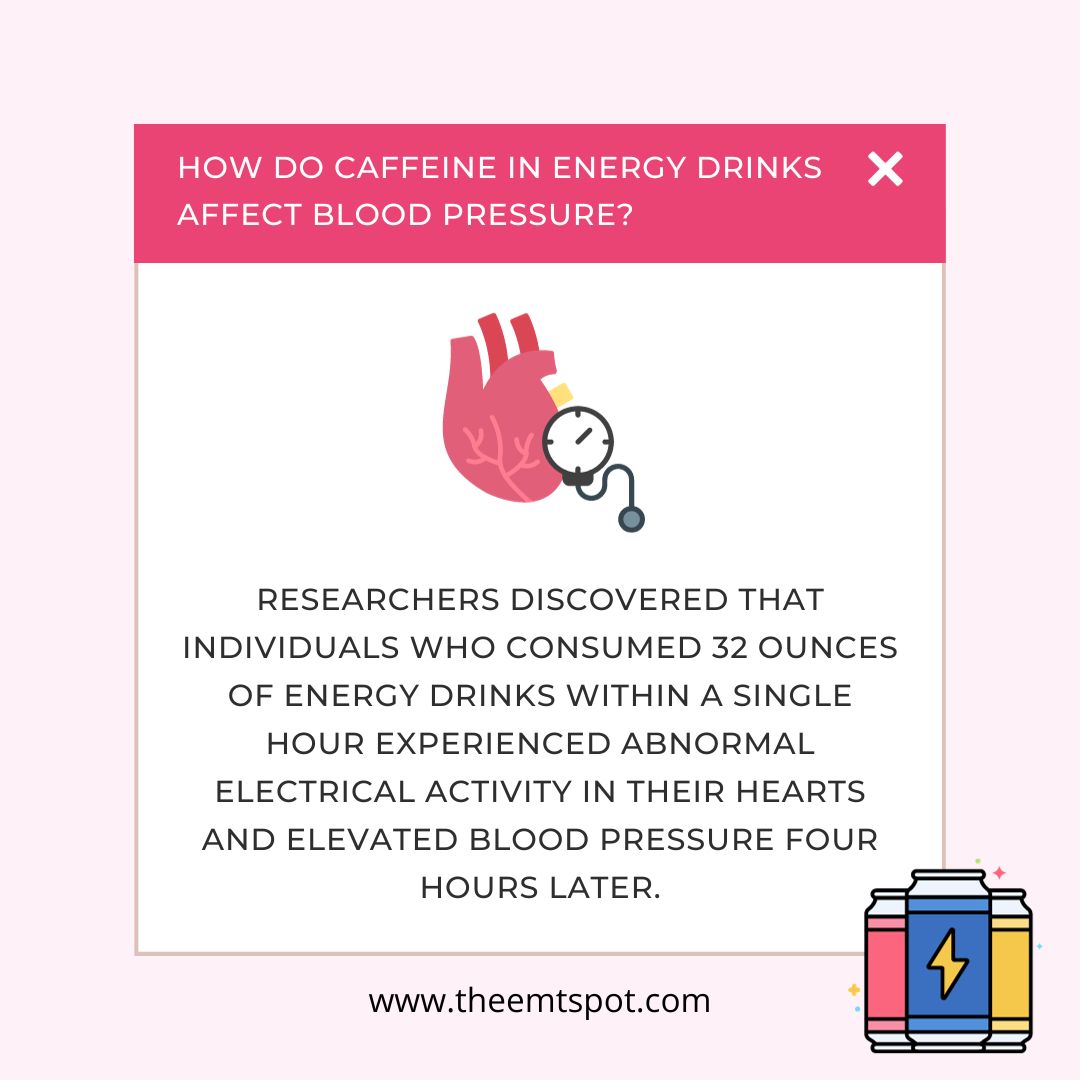
Lead author of the study, Sachin A. Shah, a professor of pharmacy practice at the University of the Pacific, underscored the significance of these findings.
He emphasized that the observed effects extended beyond what could be attributed to caffeine alone.
“We urgently need to investigate the particular ingredient or combination of ingredients in different types of energy drinks that might explain the findings seen in our clinical trial,” he stated.
Co-author Kate O’Dell, a professor of pharmacy and director of experiential programs at the University of the Pacific, emphasized that:
“Energy drinks are readily accessible and commonly consumed by a large number of teens and young adults, including college students.”
It is generally advisable to choose beverages with lower caffeine content and avoid those with high caffeine levels and additional stimulants.
Drinks that also contain certain B vitamins and electrolytes can be more favorable. However, specific brand recommendations would vary based on individual health conditions and tolerance.
On the other hand, beverages with added sweeteners and additional stimulants like guarana and taurine should be avoided if maintaining good blood pressure health is a priority.
Individuals on blood pressure medication should exercise caution when consuming energy drinks. Some medications may interact adversely with caffeine, and the combined effect on heart rate and blood pressure can be unpredictable.
For those with high blood pressure, it is advisable to discontinue the consumption of energy drinks, taking into consideration individual health status and findings from various studies.
Although occasional and moderate intake may be deemed safe for specific individuals, it is recommended to completely avoid them due to the potential risks associated with elevated blood pressure and heart rate.
The previous sections might have helped you learn how caffeine in various foods impacts blood pressure.
But there is an entirely different regimen of caffeine-alternative foods that are believed to replace high-caffeine foods like coffee. Below is an informative section from a leading nutritionis.
What are the best alternatives to caffeine when you have high blood pressure?
Dr. Eric Berg DC, a renowned expert in nutrition and Director of Dr. Berg Nutritionals, offers insightful advice on coffee substitutes for individuals looking to reduce their caffeine intake.
He highlights that “some people don’t want to consume all this caffeine because it triggers the adrenal glands and can affect sleep, weight loss, and various other aspects of health.”
He also explains that even decaffeinated coffee is not entirely caffeine-free, as it retains about 3% caffeine, which can still impact blood pressure, especially in hypertensive patients.
Dr. Berg advises consumers to opt for “water processed or Swiss water process” decaffeinated coffee, preferably organic, to avoid the chemicals used in regular decaffeination processes.

He also recommends Teeccino, praising it for being “caffeine-free” and similar in taste to coffee. Teeccino is made from “chicory root, carob, barley, nuts, and cocoa” and is low in carbohydrates and sugar, making it a healthy alternative for cardiovascular patients.
Another suggested substitute is Roma, a blend of “roasted barley and chicory” with rye, which is also caffeine-free and has a nutritional profile similar to Teeccino.
In summary, Dr. Berg emphasizes that these substitutes are “completely suitable for those who want to avoid caffeine,” offering excellent options for individuals seeking to reduce their caffeine consumption without sacrificing the pleasure of a warm, flavorful drink.
Additionally, Stockton Cardiology Medical Group recommends tea as an excellent replacement for coffee and suggests hibiscus tea for those seeking blood pressure benefits.
Alternatives are healthy additions, but the ultimate solution lies in some natural approaches as described below.
What else can you do to keep blood pressure at a healthy level?
Managing blood pressure at a healthy level might seem like a tedious task, but in reality, it only takes a few simple steps in terms of diet management, lifestyle changes, and managing mental health.
Once the threshold is crossed, then blood pressure management is only possible with medications, which have their own merits.
According to AHA recommendations, below are some of the practices that you can follow to keep your blood pressure under control.
| Change | Recommendation |
|---|---|
| Eat a balanced diet low in salt | Reduce sodium intake to improve heart health and lower high blood pressure. Limit sodium to 2,300 mg a day or less (ideal for most adults). Aim for a lower sodium intake of 1,500 mg a day or less. Focus on fresh fruits and vegetables, rich in potassium, which counteracts the effects of sodium. |
| Limit alcohol consumption | Consume alcohol in moderation: less than one drink a day for women, and two drinks a day for men. Excessive alcohol can raise blood pressure and interfere with medications. |
| Quit smoking | Smoking is proven to create cardiovascular disease. Quitting smoking can reduce both systolic and diastolic blood pressures in hypertensive patients. |
| Get adequate sleep | Aim for at least six hours of quality sleep each night.Maintain a consistent sleep schedule and create a restful sleep environment. |
| Reduce stress | Prolonged stress lead to high blood pressure.Identify stressors and practice stress reduction techniques, such as relaxation exercises and engaging in hobbies. |
| Regular physical activity | Engage in regular exercise to help lower blood pressure. Maintain a healthy weight. |
| Monitor blood pressure | Keep track of blood pressure readings at home.Once in a while get a heart checkup done. |
| Get support | Build a support system to encourage adherence to healthy habits.Seek emotional support from friends and family.Consider joining a support group for practical tips on managing high blood pressure. |
How to monitor blood pressure at home?
Specific devices called at-home blood pressure monitors can be used to perform cardiovascular assessments at home, especially for those with high blood pressure or risk factors for heart disease and stroke.
Below are some key points on why and how you should perform self-monitoring of your blood pressure.
Why monitoring at home is important?
- Home monitoring can provide valuable information about the day-to-day pressures your heart faces.
- It can help in managing high blood pressure more effectively and determining if treatments are working.
- It’s especially crucial for people unable to regularly visit a doctor or who might experience “white coat” hypertension (elevated readings in a medical setting).
What are the ways to monitor blood pressure at home?
- Using an upper arm automatic blood pressure monitor: These monitors are generally considered the most accurate, as they measure blood pressure on the upper arm, providing results closer to those obtained in a medical setting. There are different types of it with smart features in some.
- Using a wrist blood pressure monitor: Wrist blood pressure monitors offer convenience due to their smaller, portable design, making them easier to use for some individuals. However, there are important usage considerations. Wrist monitors are sensitive to body position, requiring your arm and wrist to be at heart level for accurate readings.
- Using a smartwatch: Smartwatches represent emerging technology in blood pressure monitoring. Some smartwatches come equipped with blood pressure monitoring features that rely on sensors to estimate blood pressure. They offer convenience and the advantage of continuous monitoring, allowing for more frequent readings and the ability to track trends over time.
How to choose a good blood pressure monitor?
- Opt for a monitor with a cuff that goes around the upper arm for more accurate readings. Wrist and finger monitors are generally less reliable.
- Ensure the cuff size is correct for your arm.
- Look for a monitor with a clear and easy-to-read display.
- Consider the cost and check if your health insurance covers it.
- Annually, compare your home monitor’s readings with those taken at your healthcare provider’s office for accuracy.
What is the best blood pressure monitor?
There are hundreds of brands out there, but the best monitors are manufactured by Oxiline and CheckMe.
Oxiline Pressure X Pro is their top-of-the-line product with smartphone connectivity features. Some of the outstanding features are given below.
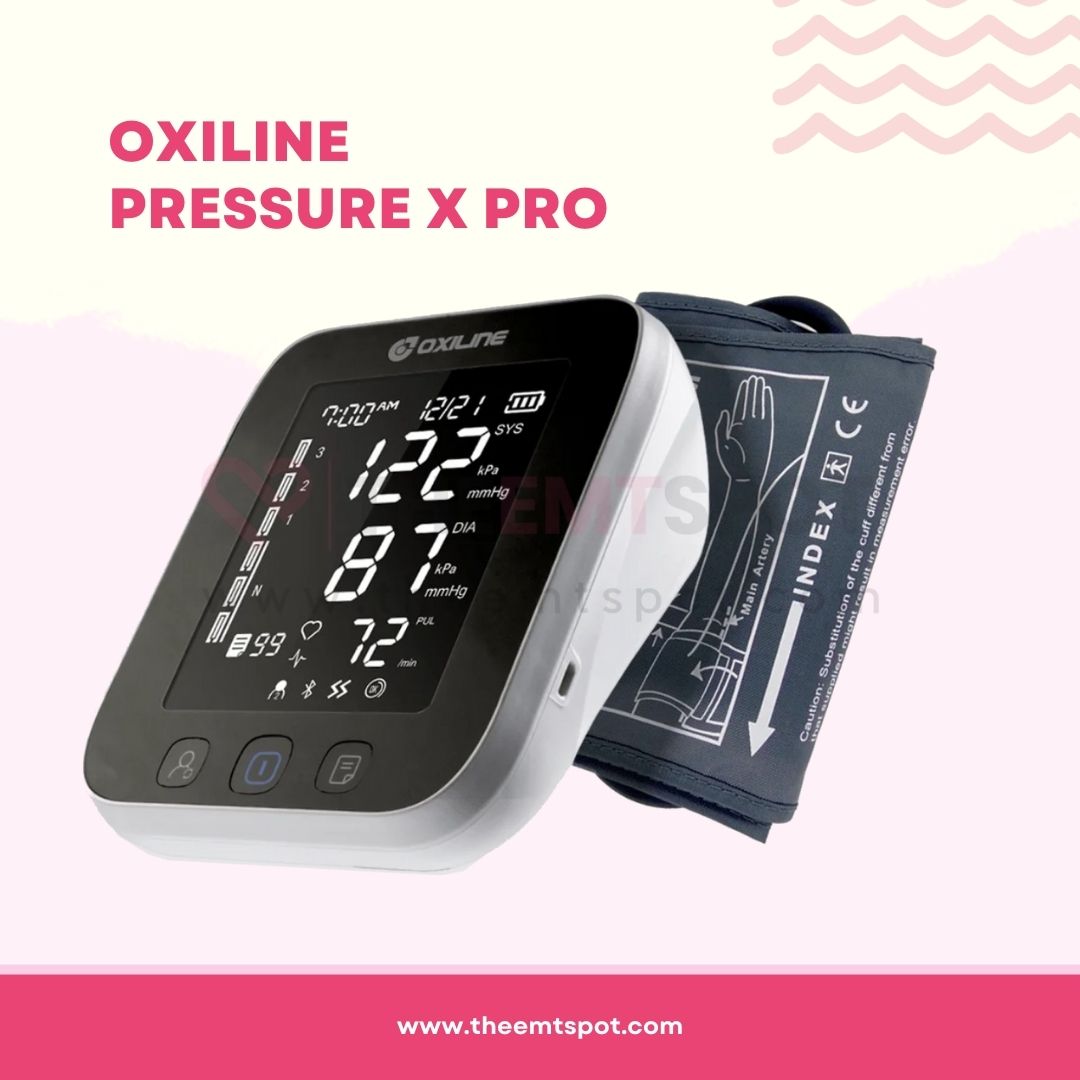
- FDA 510(k) approval
- Compatibility with a mobile app
- Utilizes VIBRA™ TX Sensor for arterial pressure detection
- Bluetooth connectivity
- Backed by a lifetime warranty
- Supports multiple users
CheckMe BP2 is a Chinese innovation with a sleek profile and an amazing mobile interface, and it’s one of the few devices with ECG recording capability. Their highlighted features are as below.
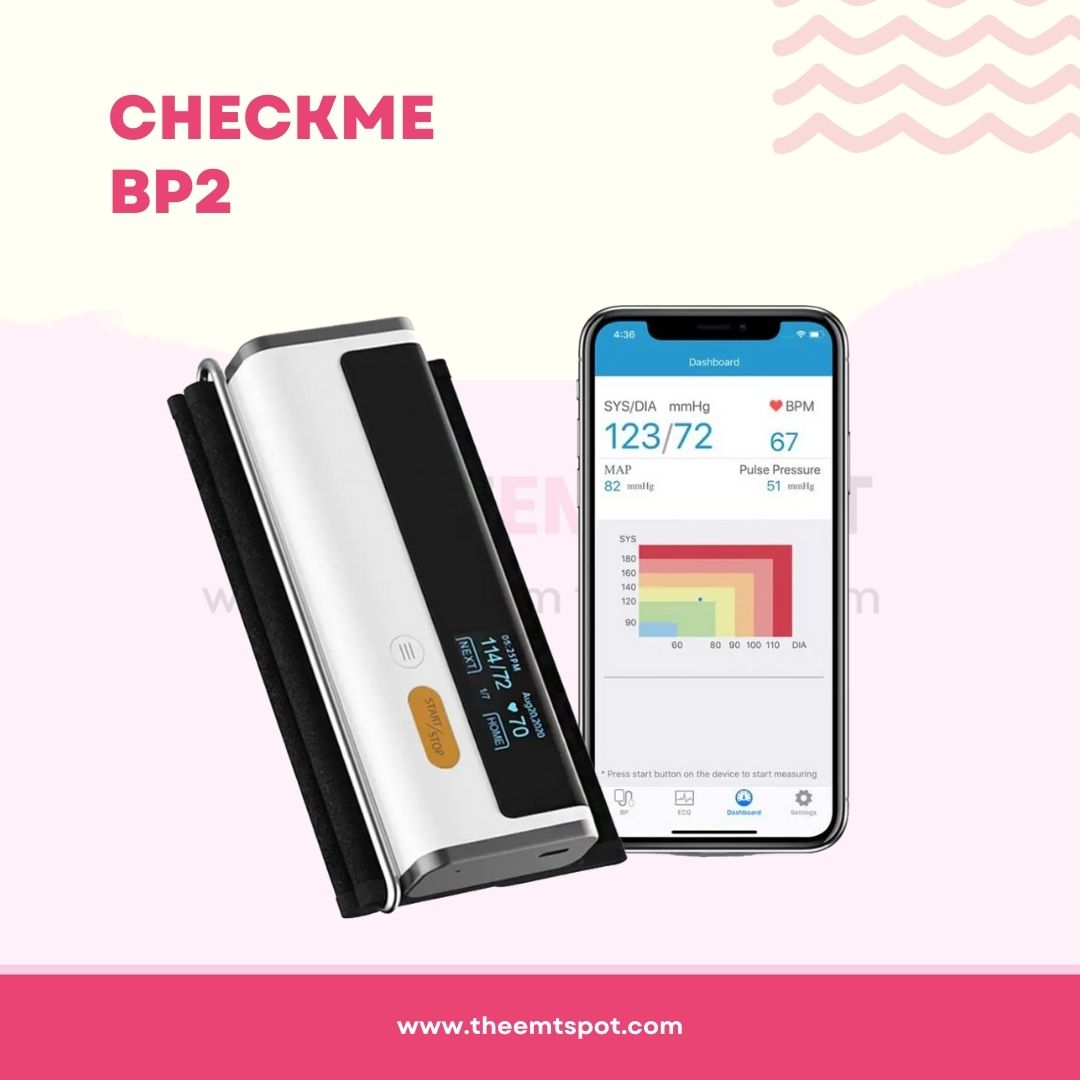
- Mobile app compatibility
- ECG functionality with AI analysis
- Both Wi-Fi and Bluetooth connectivity options
- Rechargeable battery
- Equipped with an OLED screen
- Real-time tracking capability
Other brands with smart features include Omron, Withings, iHealth, and QardioArm, all of which are well-recognized products.
More in this topic

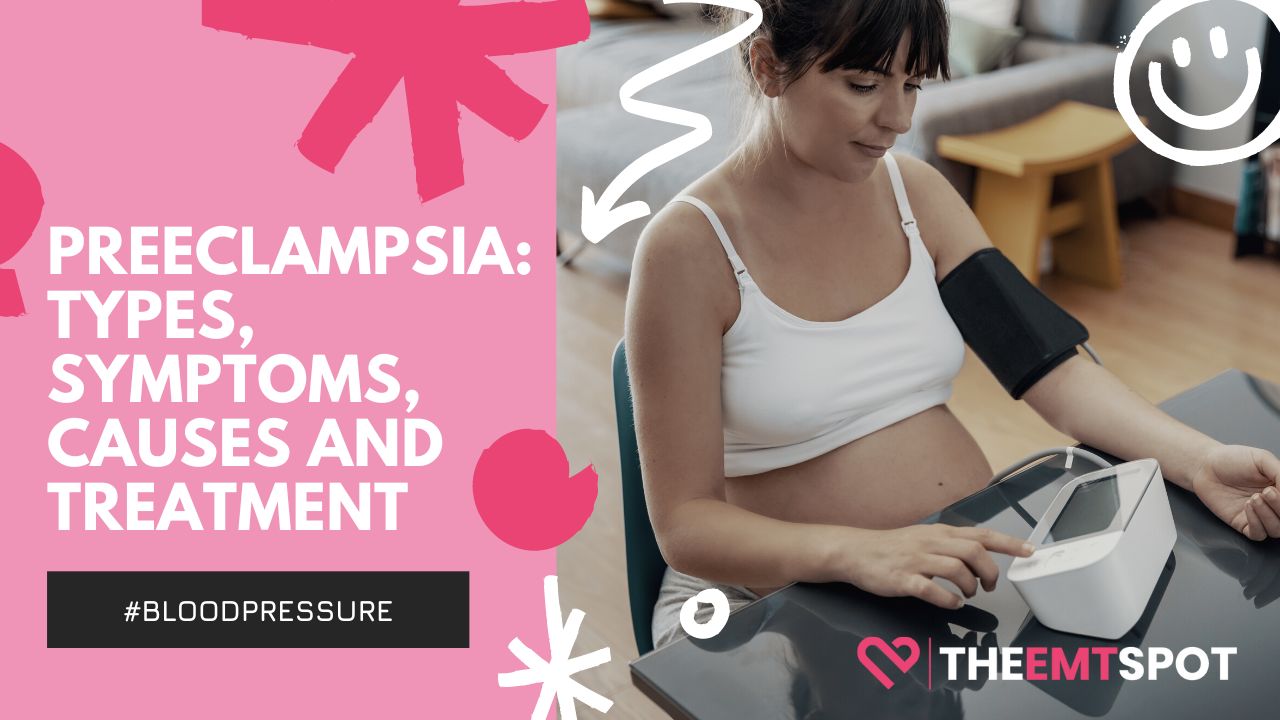
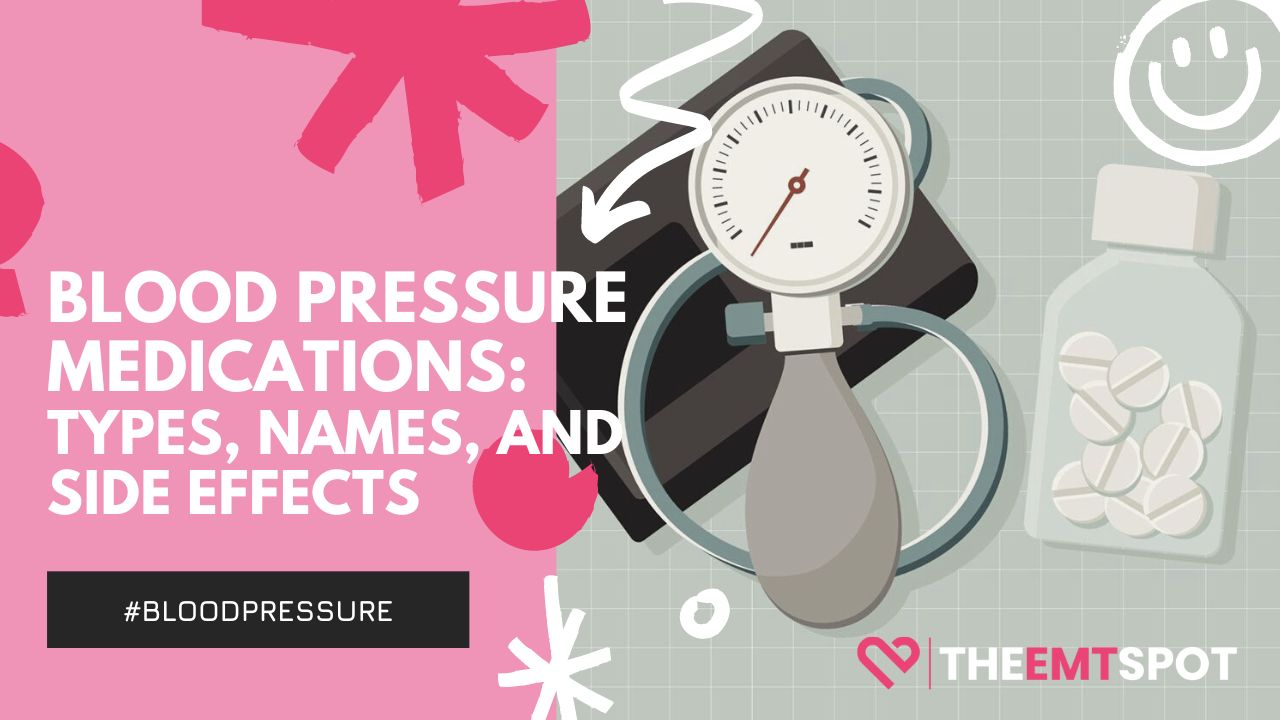
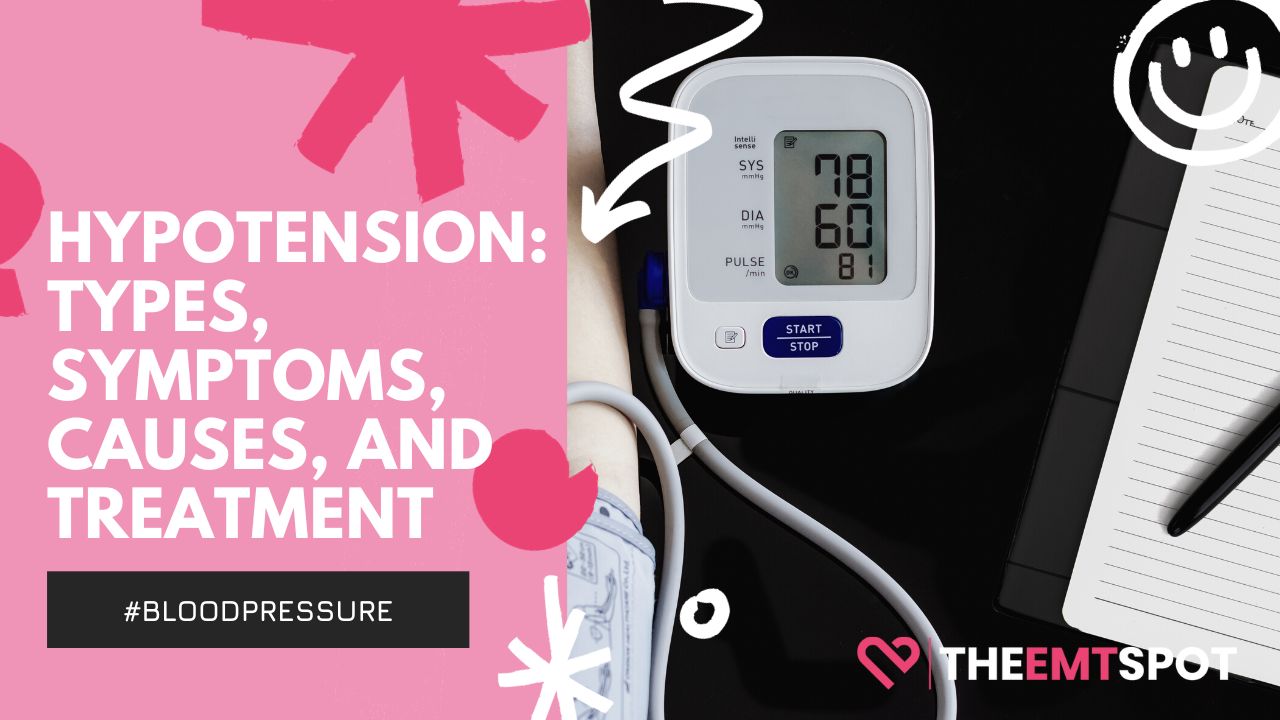
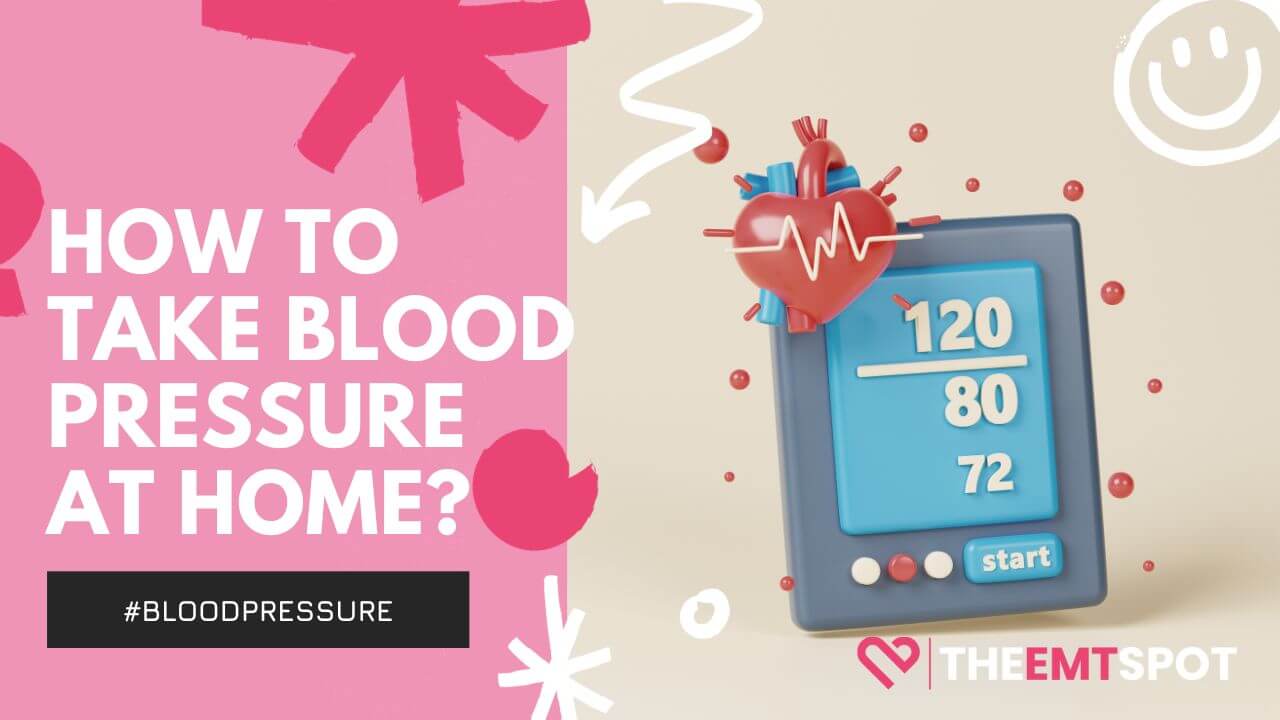
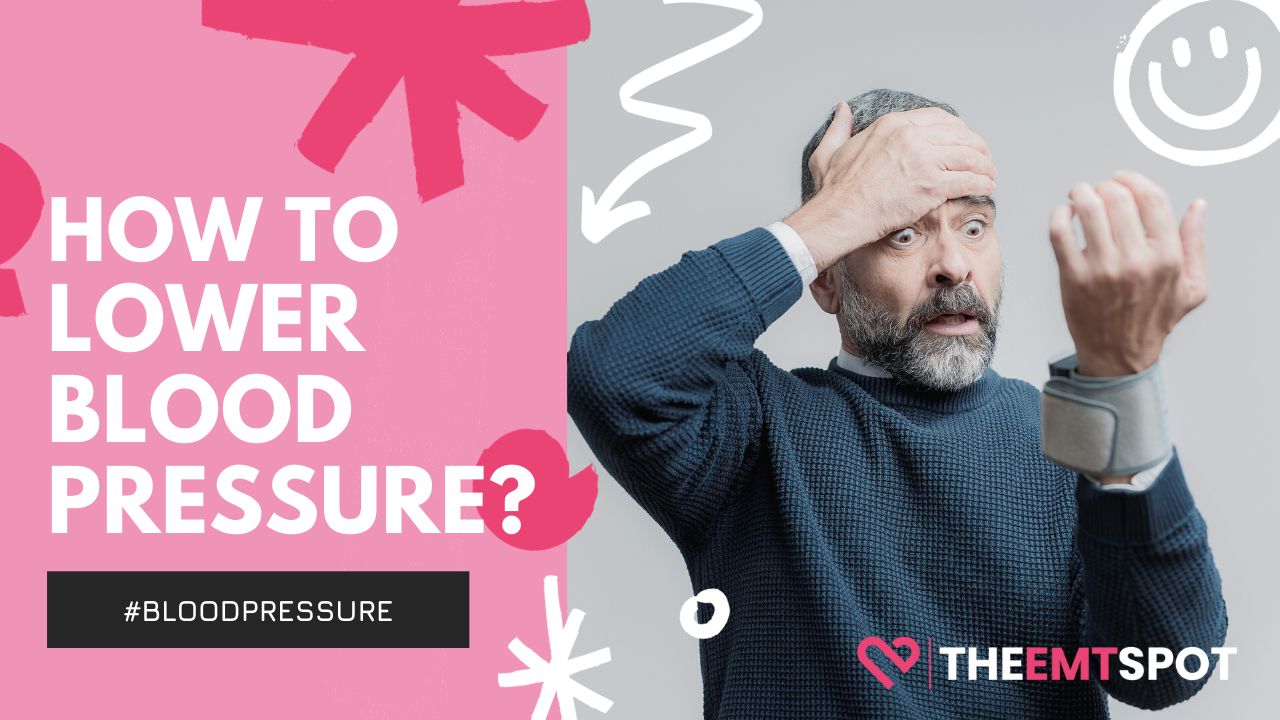
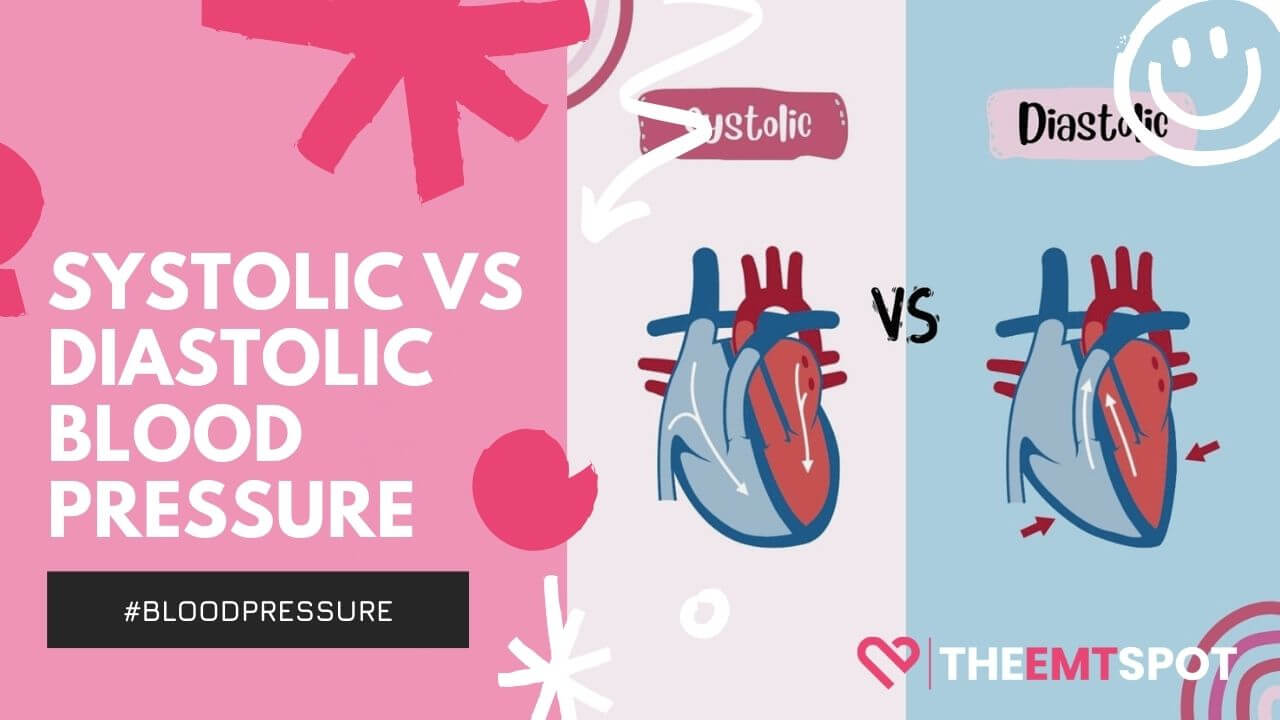
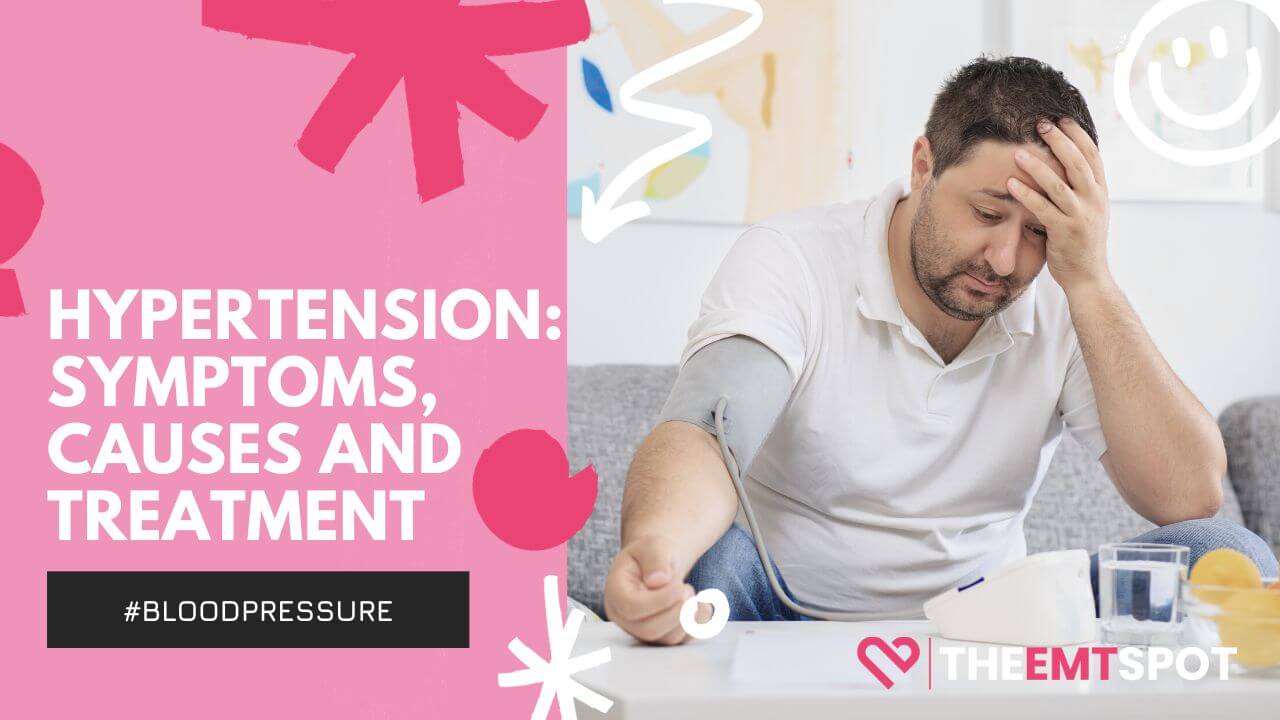
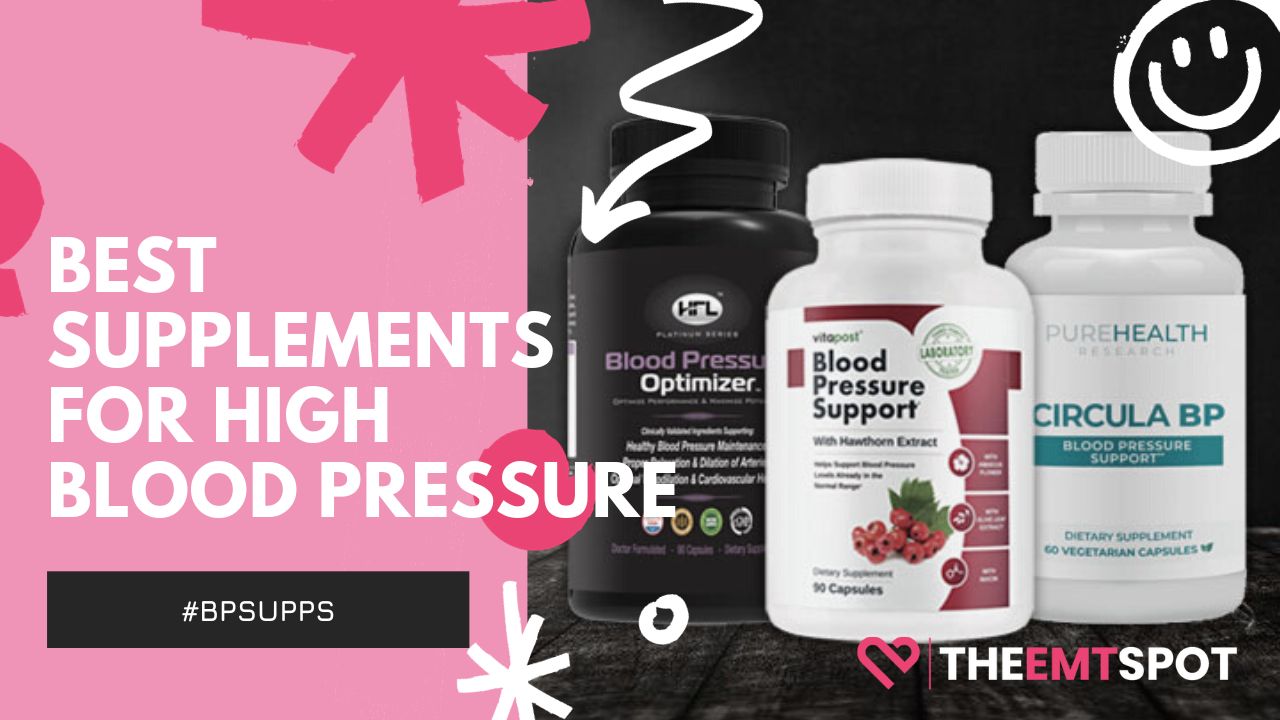
 Robin Backlund is a dedicated journalist and a medical student who has written several articles and essays exposing the falseness and hollowness of online resources in the medical science niche.
Robin Backlund is a dedicated journalist and a medical student who has written several articles and essays exposing the falseness and hollowness of online resources in the medical science niche.